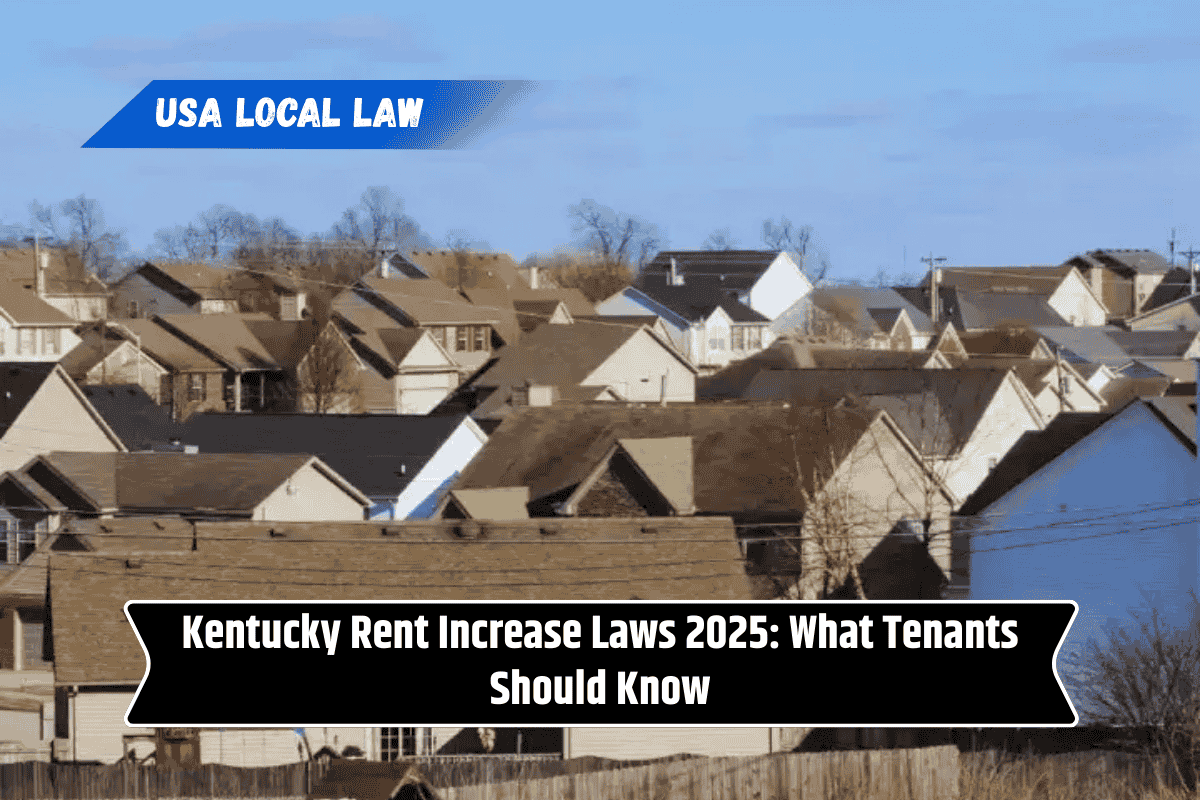As rent prices continue to rise across the United States, tenants in Kentucky are becoming increasingly concerned about the possibility of higher rental rates in 2025. Understanding your rights and the laws that govern rent increases can help tenants navigate these changes and ensure they are not taken by surprise.
In Kentucky, rent increase rules are largely governed by state law, but there are also local ordinances that may offer additional protections. Here’s what tenants need to know about Kentucky’s rent increase laws in 2025.
1. No Rent Control in Kentucky
One of the most important things tenants should know is that Kentucky does not have state-wide rent control laws.
This means landlords are not limited in how much they can increase rent, provided they follow the required procedures. Unlike some states that impose rent caps, Kentucky allows market forces to determine rent prices.
However, tenants should still be aware of the rules that protect them from unfair practices and ensure that rent increases are implemented properly.
2. Lease Agreements and Rent Increases
If you have a fixed-term lease agreement (e.g., a 12-month lease), your landlord cannot increase the rent during the term of the lease unless the lease explicitly allows for rent increases.
Rent can only be increased once the lease expires, or during a renewal period. In Kentucky, landlords are required to notify tenants of any rent increase within a reasonable time frame, which is generally 30 days.
For month-to-month leases, however, the landlord can raise the rent, but they must also provide 30 days’ written notice before the increase takes effect. This notice must clearly state the new rent amount and the date it will be applied.
3. The 30-Day Notice Requirement
As mentioned, Kentucky law mandates that landlords provide at least 30 days’ written notice before increasing the rent. This gives tenants some time to consider the increase and make decisions about whether to negotiate, accept the new rate, or even look for another place to live.
It’s important to note that this applies to both fixed-term and month-to-month leases, though tenants with fixed-term leases are usually protected from rent hikes until the lease is renewed.
4. Restrictions on Rent Increases for Certain Properties
While Kentucky does not have statewide rent control, there are some restrictions in place for certain types of housing. For instance, rental units that are subsidized by government programs or part of affordable housing initiatives may have specific rules regarding rent increases.
For example, if you live in government-assisted housing, your rent is often based on your income, and any increase in rent would be governed by federal regulations.
Additionally, some local jurisdictions in Kentucky may have rent control or rent stabilization laws for certain types of housing, such as mobile home parks. It’s important to check with your local government to determine if there are any additional protections in your area.
5. How to Handle a Rent Increase
If you receive a notice of a rent increase, there are several options you can consider:
Negotiate: You can attempt to negotiate with your landlord. Some landlords may be willing to compromise on the rent increase, especially if you’ve been a good tenant or have a long-standing relationship with them.
Seek Legal Advice: If you believe the increase is unfair or violates your lease agreement, seeking legal counsel can help clarify your rights and possible actions.
Look for Alternative Housing: If the rent increase is unaffordable, you may need to consider moving to a new rental property. Keep in mind that with a 30-day notice requirement, you will typically have a month to find a new place.
6. Can You Challenge a Rent Increase?
While Kentucky doesn’t provide legal grounds to challenge rent increases for most tenants, there are exceptions. For example, if you feel that the rent increase is being applied in retaliation (for example, if you’ve reported a housing code violation or made complaints about the property), you may have grounds to challenge it.
In such cases, it’s recommended to consult with a local tenant’s rights organization or an attorney to discuss your options.
7. Landlord’s Responsibilities
Although landlords can increase rent according to Kentucky laws, they still have obligations toward their tenants:
Proper Notice: As mentioned, landlords must give proper written notice of any rent increase.
Habitability: A rent increase should not affect the habitability of the property. If a landlord raises rent but fails to maintain the property or make necessary repairs, tenants may have the right to withhold rent or even break the lease under certain conditions.
8. Local Ordinances and Exceptions
While Kentucky does not have statewide rent control, local cities and counties may have additional regulations or ordinances that protect tenants. It’s worth checking with your local housing authority to see if your city has specific rules regarding rent increases or tenant protections that could apply to your situation.
Rent increases are an inevitable part of renting in Kentucky, but understanding your rights as a tenant can help you navigate these changes.
Keep track of the terms of your lease, ensure that you receive proper notice, and know that you can explore options like negotiating the rent increase or seeking legal advice if you feel the increase is unjust.
